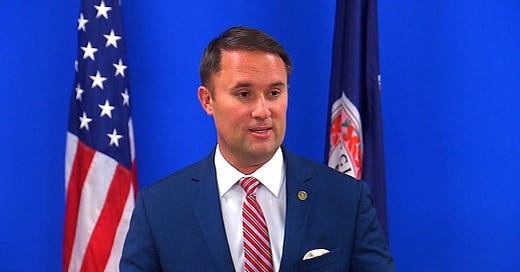Virginia's Attorney General Investigates the Northern Virginia Public Schools
Virginia Attorney General Jason Miyares Pursues Wrongdoing in the Fairfax County and Loudoun County Public Schools
State and federal prosecutors have broad discretion. The allocation of their investigative and prosecutorial resources reveals their law enforcement priorities. This seems to be especially true of Virginia Attorney General Jason Miyares.
An Overview of the Attorney General’s Investigations of Virginia Public Schools
Miyares has initiated multiple investigations of the Loudoun County and Fairfax County public schools. Immediately after his inauguration, Miyares announced an investigation into the Loudon County Public Schools’ handling of a sexual assault case. Miyares is also investigating the admissions practices at Thomas Jefferson High School for Science and Technology, a Fairfax County Governor’s School.
The Loudoun County and Thomas Jefferson matters have been controversies for some time. Two other recent investigations, one of some of the Fairfax County high schools and one of Cooper Middle School in McLean, illustrate Miyares’ policy agenda.
Target: Schools That Fail to Notify Students of National Merit Scholarship Exam Results
On January 9, 2023, Miyares’ office issued a Notice of Investigation to Fairfax County Public Schools (FCPS) Superintendent Michelle Reid. The Notice of Investigation announced that Miyares’ office would, “investigate whether any students’ rights were violated as a consequence of alleged withholding of National Merit recognition by high school administrators or FCPS.” The Notice of Investigation can be seen
The Notice of Investigation is sloppily written. FCPS high schools could not have been “withholding [of] National Merit recognition” from students: that recognition is conferred on students by the National Merit Scholarship Corporation (NMSC). A high school has no more authority to “withhold” such recognition than it would to “withhold” recognition from a student who won the World Championship Chili Cook-Off.1
The alleged misdeed, according to media accounts, is a failure by some FCPS high schools to notify students that they earned recognition for their scores on the National Merit Scholarship Exam. The controversy appears to relate to “Commended” recognition—a “well done” on the exam earned by about 34,000 students nationwide. The exam’s higher achievement tiers are Semi-Finalist, Finalist and National Merit Scholar.
According to WTOP, Reid has denied the existence of a systemwide effort to devalue these awards. “Let me clearly state this is not a war on merit, nor was it a concerted systemwide effort to deny recognition to these students,” Reid said in a letter to the community.
The Notice of Investigation asserts a possible violation of the Virginia Human Rights Act (VHRA) which makes it unlawful for a public official to deny any, “of the accommodations, advantages, facilities, services, or privileges made available in any place of public accommodation on the basis of race, color, [or] national origin.” The Notice of Investigation concludes:
If any of the protected bases listed in the Virginia Human Rights Act was a motivating factor for Fairfax County Public Schools' or any high school's decision to withhold any information from a student regarding any recognition from the National Merit Scholarship Corporation, or any other merit recognition, then FCPS has violated the Virginia Human Rights Act.
High schools are not the exclusive information source for National Merit Scholarship Exam results. A September 14, 2022 NMSC press release says that it was “excited to announce the names of more than 16,000 Semifinalists in the 2023 National Merit Scholarship Program,” and that the NMSC sent those names to the news media.
So, consistent with the culture war playbook, the failure at some FCPS high schools to tell students about their success on the National Merit Scholarship Exam—information that is and was readily available from the NMSC and elsewhere—have been potentially criminalized by Miyares’ investigation.
To prevail in a case against the FCPS high schools that neglected to tell their students about their National Merit Scholarship Exam results, Miyares’ office must identify acts by school personnel that were intended to harm those in the VHRA’s protected classes, namely people of a specific “race, color, [or] national origin.”
Proving a VHRA violation on these facts will be an uphill climb. First, the NMSC determined the exam outcomes of students at each school. The high schools could not have manipulated the scores to discriminate against a protected class. And, there is no evidence that the schools notified some students, but not others.
Thus, the investigation must identify a protected class or subgroup (“race, color, [or] national origin”) of people harmed by a school failing to inform students who were successful on the National Merit Scholarship Exam. Media accounts connect Miyares’ investigation to another political battle: the controversy about the size of the Asian-American population at Thomas Jefferson High School for Science and Technology and the efforts, which resulted in litigation, to change the school’s admissions processes. In the minds of some, the woke conspiracy of silence by the high schools to disadvantage Asian-Americans (a protected class) and make other students “feel better” by “withholding recognition,” or omitting to notify students of their scores, is evident.
It is inarguable that schools should notify students who receive awards on a timely basis. However, in the absence of evidence of intent not to notify all a school’s students to disadvantage or harm students in a protected class, Asian-American or other, there can be no VHRA violation. If school personnel can truthfully testify, “Gee, I thought [insert name of school department] was handling National Merit notification,” then there is no case. And, as a practical matter, the VHRA, an anti-discrimination statute, was not enacted to compel information deliveries by high schools to students.
Target: Schools That Invite Subgroup Participation in Programs
On March 9, Miyares’ office sent a letter demanding that Cooper Middle School in McLean stop notifying students about an FCPS college preparatory program, “based on race, color and national origin.”
The letter cites this language in a school email to parents:
Do you have an 8th grader who WANTS to go to college AND Do they fall into one or more of these categories?
• Students who are the first in their family to attend college in the U.S.
• Black or African American students
• Hispanic students, of one or more race
• Students with disabilities
• English learners
• Economically disadvantaged students
If you do, PLEASE APPLY for Fairfax County’s College Partnership Program.
The letter demands that Cooper Middle School provide evidence, within six business days, that it has “retracted and corrected” its email to parents and “is conducting the application process for the College Partnership Program in a nondiscriminatory and legal manner.” The entire letter can be seen
In response, FCPS issued a statement asserting that inaccurate media media coverage of the College Partnership Program is connected to the letter from Miyares’ office:
As stated previously, media coverage referencing a ban on certain demographic groups applying to the College Partnership Program is wholly inaccurate. In fact, in School Year 2022-23, 352 Asian students (17.4%) and 176 white students (8.7%) out of a total of 2,018 students were enrolled in the program which is designed to encourage historically underrepresented groups to consider a path to college.
We are disappointed that no one from the Office of the Attorney General for the Commonwealth of Virginia contacted Fairfax County Public Schools to check on the authenticity of these reports. Instead, false and damaging public accusations against Cooper Middle School have been made. Publishing false narratives like this undermine public school efforts to boost U.S. educational achievement.
It will be interesting to see if FCPS, or Cooper Middle School, responds further to Miyares’ demands that FCPS retract the email and for evidence of nondiscrimination in the application process for the College Partnership Program
What Can Be Learned from the Attorney General’s School Investigations?
Some possible takeaways:
Cooper Middle School's email to parents, which can fairly be read as urging student subgroups to participate in the College Partnership Program, was an avoidable error.2 The investigation confirms that every school-to-community message, no matter how well-intentioned, will be scrutinized for potential discriminatory effect. Programs sponsored by schools and governments to lift people up cannot be limited to subgroups and the eligibility criteria for such programs must be carefully described. That a group allegedly discriminated against is, or may have been, privileged is of no consequence. The best approach is to invite everyone to participate in every academic opportunity. The communication challenge for schools is to convey that while all are welcome to participate, some programs may be particularly helpful for certain students.
The investigation of the FCPS high schools that failed to tell students about their National Merit Scholarship Exam results suggests a different lesson. Bringing a case for a VHRA violation with a probability of success seems to be a tangential concern. The real objective is to maneuver the law, specifically the VHRA, to launch a culture war/political offensive on behalf of supposedly aggrieved parents (read, voters) who were allegedly wronged by corrupt school administrators.
Miyares’ investigation of the FCPS high schools is a familiar move: a public official, acting as a grievance merchant, employs the law as a tool for culture war/political advantage. In the words of the social philosophers Sonny and Cher, “The beat goes on.”
House Bill 2426 introduced in the recent session of the General Assembly prohibits schools from failing to notify students that they received awards. The bill, which was blocked in the Senate, is the legislative parallel to Miyares’ investigation of the Fairfax County high schools. See Using a Sledgehammer to Swat a Fly in the Columns section of About Alexandria.
Programs for which subgroup membership is an eligibility criterion are problematic in other contexts. In late January, the City of Alexandria received complaints similar to those made against Cooper Middle School about a program designed to encourage minority business development. According to the March 9 edition of The Alexandria Times, businesses eligible for program grants of $1,000 to $7,000 had to be owned at least 51% by Black, indigenous and people of color. On February 13, the city issued a statement saying that “we will not launch the program as currently proposed.” The Times coverage can be seen






On March 31, The Washington Post reported that an internal investigation conducted by a law firm found that the delayed notifications by some Fairfax County schools to students of National Merit commendations were not intentional.
You can read the Post's account here: https://www.washingtonpost.com/education/2023/03/29/national-merit-fairfax-investigation-findings/